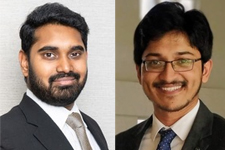The Role of Big data in Judiciary
Published: May 29, 2021

By Prashanth Shivadass and Sriharsha Palanki
THERE was a major paradigm shift in the way of life nearly a 100 years ago, with the Spanish flu and world wars. The world has not seen anything this devastating until the current 'COVID' pandemic. The pandemic has left not only questioned health and other political infrastructures of not just developing countries, but also the developed.
India has not been far behind. The last year though, there has been one positive change - the development of the judiciary to introduce virtual courts and e-hearings/filings. While many discussions have ensued about the pros and cons of this facility, it has certainly been a game changer and is here to stay.
Virtual Courts emerged as saviors for continued justice delivery. The next decade will mark a historic paradigm shift in the functioning of the judiciary with the integration of Artificial Intelligence (AI). The deployment of big data systems and AI in the functioning of Courts, mark a transformative phase in the system.
In April 2021, the Supreme Court Portal for Assistance in Court's Efficiency (SUPACE) was launched by the AI Committee. Additionally, a neural translation tool that predicts the sequence of sentences in real-time by using an artificial neural network (which usually exists in smartphones), has been setup by the Supreme Court. This neural translation tool is named Supreme Court Vidhik Anuvaad Software or "SUVAS".
What is Big Data?
Big data essentially mean massive sets of data collected from various fields in digital format resulting in a "data flood". This data flood is analyzed by computational and mathematical models to detect possible trends and patterns. The primary benefits of such rapidly advancing techniques are natural-language processing, pattern recognition and machine learning. With the humongous number of cases being filed across the country, it has become a tedious task for the judiciary to track the information, orders, precedents, and so on.
This unstructured voluminous data can be processed with tools like SUPACE and SUVAS. The tools determine the type of insights Courts could gain to deliver timely justice. Big data further analyzes the nature of the case and provides pre-processed data to the judiciary which would aid them better at discharging their responsibilities. The SUVAS and SUPACE software is the first generation of the AI system. 1
SUPACE - Supreme Court Portal for Assistance in Court's Efficiency
The SUPACE 2 software identifies and extracts the objective facts from the file i.e., the date, time, place of occurrence of event and such other details to identify the relevant case. The software also prompts questions and answers where the user is provided with the feature to perform all such tasks which are usually undertaken in parts that are not properly integrated towards the end.
SUVAS - Supreme court Vidhik Anuvaad Software
The SUVAS software translates judgments and legal documents from English into nine regional dialects. This saves valuable time and helps the common man understand the judgments in various local languages. The then Chief Justice of India, Justice Bobde, who introduced the AI technology to the Supreme Court explained the benefits, summarized as under: 3
1. The AI can retrieve information instantly for the judges as opposed to turning the pages of a book;
2. It could simultaneously display the arguments made in any of the courts and the findings of such courts;
3. The software can prompt relevant data so that information available is adequate enough for deriving an appropriate inference;
4. AI functions with breathtaking speed cutting down on the scope of errors. It would reduce the burden on the administrative workforce in the court offices.
On the contrary, the Advocates could benefit in the following manner:
1. Performing automated keyword-based search for legal precedents useful for ongoing research;
2. Indexing, storage and retrieval of information for ongoing cases of the firm;
3. Creation of an automatic schedule for Advocates to track the hearings;
4. Record the proceedings, daily orders and judgements.
The Future of law
Lawyers deal with voluminous documentation at every given possibility - be it in litigation or Corporate and M&A. Every lawyers' knowledge and expertise, becomes essential and vital in bringing an end to a legal matter. In the eyes of an AI system, this knowledge and experience is 'unstructured data' and therefore the AI pieces together this unstructured data to provide some form of analysis and training to others, including junior lawyers.
AI may also be utilized to undertake an assessment of the matter at hand basis legal precedents. This aids the Advocate in ascertaining if the matter holds adequate merit to proceed with litigation and to make an informed decision. The application of AI to law will be similar to a 'Google Maps' application which collects and collates real-time information and calculates the average time to reach a certain location. Under unforeseen circumstances, alerts are sent to the users and a revised estimate is displayed on-screen. Data such as traffic, average speed, historical data etc., are collected to make such reasonable predictions.
Conclusion
Substantial volume of data has no value. However, it acquires the character of being useful upon critical analysis of other facts relevant to the issue at hand. With gigantic leaps that big data is making, businesses are automating their processes, eliminating the need for human intervention. Eventually, legal advice may be sought from a computer empowered with big data, therefore rendering the current system obsolete. Thus, it is imperative that the art of Advocacy remains indispensable by exploring ways to align with the evolving times that brought us AI.
[The authors are Partner and Associate respectively, with Shivadass & Shivadass (Law Chambers). The views expressed are strictly personal.]
1 https://districts.ecourts.gov.in/sites/default/files/Invitation%20of%20Launching%20of%20AI%20Portal%20SUPACE_2.pdf
2 Invitation by Supreme Court regarding the launch of SUPACE and SUVAS portals, April 6, 2021, https://twitter.com/LiveLawIndia/status/1379394969845211140/photo/1
3Rushda Khan, Big Data Revolution in the Supreme Court, Live Law, May 9, 2021, https://www.livelaw.in/columns/supreme-court-big-data-revolution-supace-covid-19-173867




